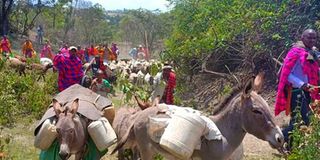60,000 families targeted in second Mau Forest eviction

Families moving out of the Maasai Mau Forest in Narok on September 1, 2019 ahead of the looming second round of evictions. Some leaders from the Rift Valley are opposed to the evictions. PHOTO | GEORGE SAYAGIE | NATION MEDIA GROUP
What you need to know:
- The move now confirms Cabinet Secretary Keriako Tobiko’s announcement that the restoration of the Mau is on course.
- Just two hours after the security forces moved into the forest, a flow of illegal settlers out of the forest started.
- Some 60 Maasai families packed their belongings and were on their way out on Sunday.
It is all systems go in the Maasai Mau as Kenya Forest Service (KFS) rangers move into the forest in preparation for another round of evictions eviction.
The government has given the settlers a 60 days window period to start packing and leave the water tower by October 31.
The move now confirms Cabinet Secretary Keriako Tobiko’s announcement that the restoration of the Mau is on course and the settlers must pave way for it to happen.
FOREST RANGERS
This is after a contingent of more than 100 KFS officers aboard trucks and off-road vehicles were dispatched from the Narok County ecosystem coordinator’s offices to three camps in the forest to carry out the second phase of evictions, targeting some 60,000 families.
We caught up with the convoy of the vehicles at the TM junction, four kilometres from Narok town along the Narok-Bomet road headed towards Narok South and diverted at Oloulunga junction towards the Maasai Mau.
Despite saying he is not allowed to speak to journalists, former deputy chief conservator of forests in charge of forests protection and security Alex Lemarkoko seemed to be spearheading the coordination of the rangers to the forest.
MOVING OUT
Just two hours after the security forces moved into the forest, a flow of illegal settlers out of the forest started.
Some 60 Maasai families packed their belongings and were on their way out on Sunday.
Though there was panic in some of the villages, a full scale migration had not started.
However, some settlers were already moving out.
We caught up with the families with their livestock and belongings as they approached Nkareta where they are currently seeking shelter.
One of them, Mr Moses ole Kiok, who had 80 acres of land at the former Enkaroni group ranch, said he heeded the government’s directive to voluntarily move out and called on all the other settlers to do the same.
"After we saw the deployment of rangers to the forest today, we decided to troop out to Nkareta area, seek shelter from relatives for some time before we seek alternative shelter," said Mr Kiok.
CANCEL TITLE REEDS
The deployment of the forest rangers is an indication that the government is committed to evicting the settlers after the State published in the local dailies 1,274 title deeds in the Mau complex targeted for cancellation.
The Ministry of Land in 2018 sought court orders to nullify the title deeds which were "irregularly and unlawfully issued".
The court in June granted the prayers, asking the ministry to publish the title deeds, their owners and acreage of land they acquired.
Environment Cabinet Secretary Keriako Tobiko has already given a nod for the eviction to go on.
Rift Valley Regional Commissioner George Natembeya last week said the government is ready for the eviction and gave the settlers 60 days to voluntarily move out.
RANCHES TARGETED
The targeted area is land where five ranches which are believed to have been extended were.
The land is targeted for reclamation to restore the water tower that affects the lives of about 10 million people.
The phase one of the evictions that saw 12,000 illegal settlers removed was centred in the Reiya group ranch.
The second phase has Nkoben, Ilmotiok and Ololunga on the radar.
Other areas are Enokishomi, Enoosokon, Nkaroni and Sisian.
Some Rift Valley leaders have vehemently opposed the impending evictions, saying if sanctioned, some 8,000 school children, including 1,000 candidates set to sit their national exams at the end of the year, will suffer.
On July 25, Mr Tobiko announced the plans to evict people from the forest, sparking off a heated debate among Rift Valley leaders.
And as the government gears up to evict 60,000 families settled around the Mau Forest complex in what is expected to be one of the most explosive issues in the country, a group of Rift Valley leaders are seeking to stop the exercise.





